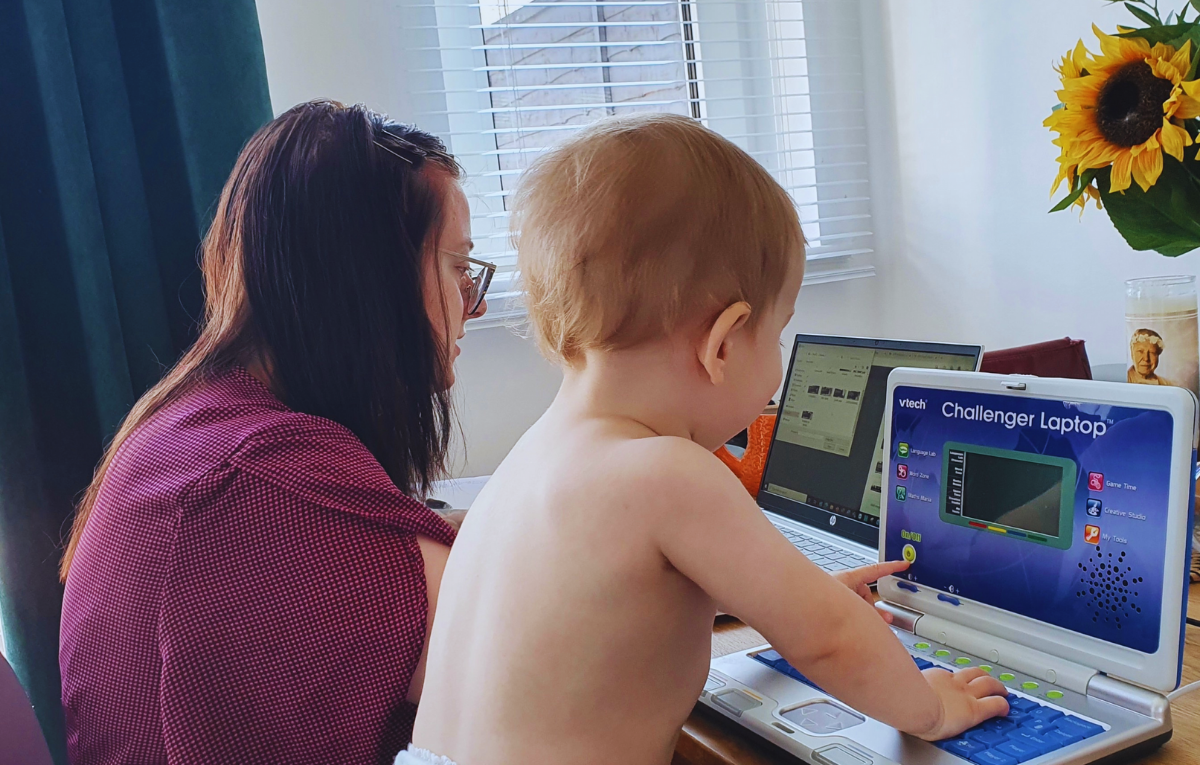
Hybrid Living is about choosing life. The last century has seen the world of work transform exponentially. From the industrial revolution to the technological takeover, work is not what it used to be. And neither are we. It was once the case that the best way we could show up for our families was by our absence, earning money to pave the way for our children’s futures, funding our homes, and meeting our employers’ needs.
Now, we can work from anywhere. The way society has defined the role of work and workers has shifted as we work towards greater equality in the workplace. Many restrictions have been lifted, whether due to our gender, race, sexuality, religion, or politics. The new virtual workspace has enabled greater participation from women and those less likely to speak up in a physical office – supporting neurodivergent workers and more introverted individuals.
Cloudbooking sat down with three exceptional people who are practising Hybrid Living. Whether that means balancing family commitments, combining travel and entrepreneurship, or keeping their finances afloat whilst surviving in a warzone – Hybrid Living has been a welcome workplace evolution.
One: Family Time
According to Working Families, an organisation supporting employers and employees to adapt work for those with families, polling found that 82% of UK parents would likely apply for a role that lists flexible working options. If the choice is between being there for your child or submitting to the outdated time frames of eras gone by, parents are clear on where they stand.
Chloe, a marketing superstar at Cloudbooking, is a working mum with a child with special needs. She said how a hybrid living model had helped her:
“Since working at Cloudbooking, the pressure has definitely been taken off me in terms of our family life. So I can drop my little boy off at nursery. I don’t have to worry about dropping him in or picking him up, and I don’t need to feel stressed when he’s ill because I can have him at home while I work.”
“Rather than an office lifestyle where you’re panicking about taking him to nursery because you might be late and reprimanded for arriving at 9.15 instead of 8.30 – I can relax and get everything done to a schedule that works around other commitments.”
Chloe previously worked in a hybrid office, where she felt the pressures of balancing her career and caring for her family. Now, she can enjoy the best of both worlds and not feel torn in two.
I don’t feel like I’m being penalised for having a child.
“It’s helped us as a family because there isn’t the same pressure on us to have everything thought out around the others’ needs and work schedules. We work so much better as a unit once you’ve taken the stress of being in the office at specific hours out of the equation.”
The Guardian has recently published their findings on the declining number of women in work due to the excessive price of childcare. For parents like Chloe, working from home has meant they don’t need to reduce their hours or, worst of all, leave the workforce altogether. Although childcare is still necessary, she can adapt her working hours to suit her family’s needs. Hybrid Living lets her keep working.
“It is a struggle for women because we’re expected to work, but then we get slated for not going back full-time or not working at all. I’m lucky to have a partner who will also work full-time, and our wages come together. But how can we afford to do both?
“It still blows my mind that we’re still in this place where women must choose between work or childcare. But now, I know I could comfortably return to work and have a three month 3-month-old with me. Because I can still work and focus on the child as well.”
Many primary carers still have to choose between their career and caring for their child. As Larice Stielow, a senior economist at PwC, recently said in The Guardian, “For many it is more affordable to leave work than remain in employment and pay for childcare, especially for families at lower income levels.” But this doesn’t need to be the case, and we have to wonder why women, statistically more like to be the primary caregiver, are still side-lined and outright ignored in working policies.
“I think if women are the sole caregivers of their children, these companies need to ask themselves: how are we supporting those women?” Chloe said.
“Even if it’s a case of bringing your kids into the office or saying it’s all right, you drop out an hour early. Don’t worry; we’ve got it covered here. It’s just that level of support, whether for men, women, or whatever if you’re the sole caregiver to give them the support they need because it is hard doing it on your own.
It’s just lucky that I do have a good support bubble around me, but for those who don’t – What is in place to help them?”
As the UK slips down the world rankings and the government scrambles for a viable solution – what can working parents do without the support of their employers? In a post-covid world, grit your teeth and bear it just won’t cut it anymore.
Related Reading: Work From Home Has Made ‘Dad’s Work’ Make Sense To My Kids
Two: A Warzone
Many of us can understand the anxiety of an existential threat following the Covid-19 pandemic. Most of the world was able to move on. For Hanna Bey, living in Lviv, a city in western Ukraine, however, no “new normal” has existed. Just as the pandemic was winding down, Russian troops were gearing up to invade the eastern border of Ukraine. On 24th February 2022, almost eight years after its earlier annexation of Crimea, they did.
Hanna remembers the day well:
“When the war started, it was Thursday. I remember because I woke up early, and it was Thursday, and I had just started to read the news, and I was so shocked. So, I didn’t know what to do, but we decided to go outside the city to a parent…to my boyfriend’s parent’s home. I had this chance to grab my laptop and continue working.”
Hanna has become a self-proclaimed “Hybrid Living Ambassador”. Rather than lose her income, peace of mind, or connection to her country, she works from her apartment and continues building her career. Because Hanna works for a Hybrid Living organisation, she can continue working throughout the war.
As the conflict dragged on, Hanna contributed to the resistance. She stands by her people by donating a portion of her salary to those suffering closer to the front,
“It’s the usual thing for us right now. All my friends donate every day because we know that it helps us to contribute to the victory. Because it will be a victory someday, of course.”
On 26th March, Lviv was under attack. This coverage from Sky News shows the impact of missile strikes on the city at the beginning of the conflict. Hanna considered leaving Ukraine and briefly fled the city only to return.
Ukraine, Hanna says, is “the love of her life”.
Of course, life goes on even if your country is in the middle of a war. We asked Hanna what Hybrid Living has given her.
The most important thing is that I can collaborate and work with people from around the world.
For example, with you. We have this chance to talk to each other, not sitting in the same office or working in the same country or city. But we have this beautiful chance to communicate. It feels like we are meeting in real life because we adapt to this new way of living and working.”
Hanna was keen to highlight the importance of connection, communication, and mindfulness. These practices are key to maintaining mental health and well-being whilst working in a country suddenly thrust onto the international stage. For those like Hanna, the flexibility and freedom of Hybrid Living have been a lifeline. They can continue to work but take the breaks necessary to cope in a warzone.
“It’s important to work for me. Like to work on my career, earn money, to donate. Because if I don’t work and earn money, I can’t donate to my country and can’t help my people. So, this hybrid living model, in general, allowed me to be productive and read the news.”
Often, it’s simply ‘the inhale and exhale’. Taking a breath and appreciating the world around you has been most effective in supporting civilians through the second crisis of the decade.
“Sometimes, of course, you have to take more breaks. Especially when it’s a difficult day. You get emotional when it’s sirens for the fifth time during the day. Of course, you have to, you know, sit for a while, and breathe, inhale and exhale. But in the end, you know that everything is going to be OK. You will meet your friends and talk to your grandmother again”.
Family and supporting her country have become top priorities for Hanna. Her grandmother has also remained in Ukraine, and it’s clear that the bond they share is powerful. The option to log off from work without permission or to leave the office means Hanna can reassure her grandmother that everything will be alright when she needs to. She can also take a moment to reassure herself that she is still relatively safe in Lviv.
“Sometimes we get emotional because you just read news and start reading of… I don’t know. Poor children or someone my age. Or someone that reminds me of my grandmother, for example. And I would love to help them, but I can’t go there. So, I decided to help people living here, like my grandmother in Lviv. Call her maybe more often if I can, to support her and tell her everything will be OK.”
For Hanna, Hybrid Living has enabled her to keep ‘living her life’ even in a warzone. She has the flexibility to take time for the people she loves.
If you would like to support the people of Ukraine, you can donate here.
Three: Travelling Entrepreneur
“Being a great manager and being a great remote manager are nearly identical. You don’t need to smell people to manage them.” – Remote CEO Job van der Voort – remote.com
The role of the CEO now encapsulates an almost Presidential aura. It sets the tone for the entire company’s public image and even influences how the sector behaves as a whole. Who doesn’t associate the robust social media outputs of Elon Musk with the branding of Tesla? Or the intergalactic ambitions of Jeff Bezos with Amazon?
For Ian McCaig, Co-Founder and Director of Fiit, that means being active. Now living in Buenos Aires, Ian can enjoy the vital vitamin D he needs to run a growing digital fitness empire.
Following the pandemic, Ian took the time to reflect on how he worked:
“A lot of very, very bad things came out of the pandemic. It was a very challenging number of years. And I think one of the best things that has come out of it is this realisation that we’ve really levelled up on digital tools, our digital capabilities and working remotely with distributed workforces.”
Many might suspect moving to Latin America would complicate Ian’s relationship with his organisation in the UK. However, this hasn’t been the case:
As long as we’ve got Internet connectivity, we really can work from anywhere.
“I visited a friend over in LA who used to work with me at Qubit (recently acquired by Coveo) and was a VP of Sales. He moved over and decided that he was a bit burnt out. Working in lots of start-ups is intense; it’s hard work, and the roller coaster is extreme. He took a year off and renovated a school bus to then go travelling around America with his wife and kids.”
In fact, for Ian, living on another continent has opened new business opportunities:
“I’m spending time between Argentina and Mexico at the moment because I’m also looking into a Mezcal business. An Agave spirit brand selling into bars, Mexican restaurants, and retailers., It is literally the polar opposite of a digital fitness business. But it’s, as everyone says, happiness in life is all about balance. So sharing mezcal with friends and sharing a workout with friends (wherever in the world they might be) is my idea of balance.”
However, not everybody agrees. There is still plenty of resistance in the business community to new working methods.
“JPMorgan Chase’s Jamie Dimon has insisted that a hybrid style “doesn’t work.” Morgan Stanley CEO James Gorman says remote work isn’t an “employee choice” – Fortune.
But employees don’t appear to agree, with many looking elsewhere for flexible working opportunities. For Ian, it isn’t cut and dry. Some teams must collaborate more than others, and some can work comfortably from home. Ian said:
“There was so much innovation that happened in those couple of years in terms of the technology and tools to foster that kind of [remote] working experience and ensure it’s effective. It can be as effective in some cases a lot more effective when you’re working fully remote.”
Some even can combine a love of travel with their career commitments without skipping a beat.
“I told the business that I would be working fully remotely to test it out to the end of the year. I’d be back in January to spend some time with the team. It caused this amazing catalyst for other people to feel quite inspired that they could do something similar. So, for example, our head of finance has been doing two weeks working and two weeks holiday in Australia.”
Nobody needs to choose between the life they want and the work they do anymore. However, this reality still hasn’t reached every employer. Are you implementing remote, hybrid or flexible working in your business?
It’s Your Choice
Choice is at the heart of this new work policy. Not every employee will prefer a Hybrid Living life. However, it can be life-changing for those like Chloe, Hanna, and Ian.
For a fuller conversation on the pros and cons of Hybrid Living, check out our latest webinar here. Our Founder, Gerry Brennan, sat down with Denise Brouder, Founder of SWAYworkplace, and Marissa Huber, Workplace Strategy Director for Cushman & Wakefield, to debate the latest developments in the world of work.





